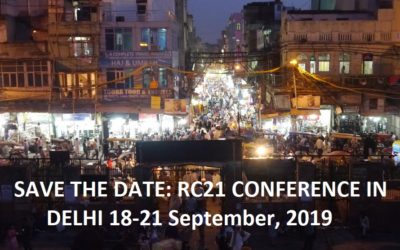RC21, September, 18-21, 2019 @Delhi
CFP: Dwelling in the interstices: modes of inhabitation and common life in the contemporary city
Please submit your 250 words abstract by the 20/01/19 filling this form: https://goo.gl/forms/v1QLbEe61Mp15kLf1
Convenors
- Dr Margherita Grazioli, Postdoctoral Fellow in Urban Studies, Social Sciences Department, Gran Sasso Science Institute, L’Aquila (Italy)
- Dr Michele Lancione, Senior Research Fellow, Urban Institute, University of Sheffield (UK)
- Dr Gaja Maestri, ESRC Postdoctoral Research Associate, School of Media, Communication and Sociology, University of Leicester (UK).
Rationale
Inhabiting the contemporary city is increasingly a matter of dwelling in its interstices. As urban spaces become privatized, securitised and governed through the logic of immediate private profit and return, urbanites worldwide organise to craft multifarious forms of urban
livings. Through this panel we are interested in attracting cutting-edge scholarship investigating the variegated practices challenging the predominant logic of bordering and governing the city.
The latter include specific devices of governance and control assembling the urban across the north and the south through privatising devices that include, among others: the marketisation of housing; gentrification; racial, spatial, social segregation; the adaptation of
urban routes to logistics movements; borders’ and mobility’s policing and securitisation. Urbanites worldwide contest these processes on a daily basis, constructing forms of dwelling at the interstices of urban space and politics. Recent scholarship has increasingly pinpointed these struggles, looking at housing squats; social centres; self-managed urban camps; co-housing and hosting; self-construction; spontaneous settlements; temporary autonomous zones (TAZs); and many others.
In this panel we are interested in exploring new forms of dwelling that articulate manifold commons within saturated and highly conflicting urban environments. The panel is not necessarily limited to the modalities listed above, and we welcome contributions that show uncanny forms of living vis-à-vis increased urban uninhabitability across the North and the South.
Key themes
We invite papers addressing, but not limited to, the following questions:
- What forms of alternative urban dwelling are emerging across cities worldwide?
- How do these alternative practices unfold, and what are their modes of organising?
- What commons and solidarities are produced through encounters in these spaces?
- How can urban theory better theorise urban interstices and their politics?
- What are the affects and material cultures activated at the interstices of the urban?
- How are these forms of urban dwelling re-captured by dispositifs of institutional governance?
Submit your abstract
Please submit your 250 words abstract by the 20/01/19 filling this form: https://goo.gl/forms/v1QLbEe61Mp15kLf1. If you have any questions regarding this session, please email Margherita (margherita.grazioli@gssi.it), Michele (m.lancione@sheffield.ac.uk) and Gaja (g.maestri@leicester.ac.uk). More info on the 2019 RC21 conference can be found at this page: https://rc21delhi2019.com

